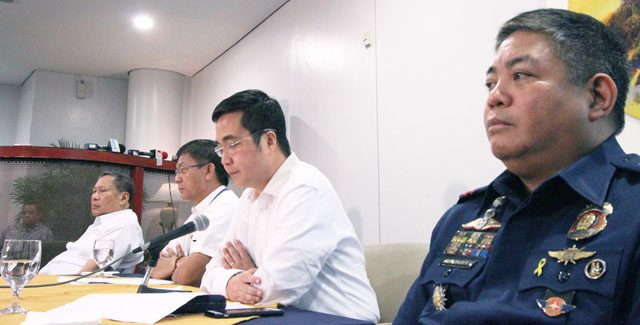SUMMARY
This is AI generated summarization, which may have errors. For context, always refer to the full article.

MANILA, Philippines – Transportation Secretary Joseph Emilio Abaya on Wednesday, November 4, downplayed concerns over a “boom” in cases of ammunition detected in Philippine airports, allegedly as part of a scheme to extort money from unsuspecting travellers.
“So far we have not established any facts to show that any syndicate happening, planting, but again we assure them as well that [if there is] any evidence [of] any [airport] personnel involved, we’ll pursue them and throw the full books at them,” said Abaya during a press conference at the Ninoy Aquino International Airport (NAIA) 3.
Mid-September, reports on cases of alleged extortion attempts by airport personnel grabbed media headlines. The detection of ammunition in the bags of travellers have warranted media attention, with almost each case making it to the news.
While Abaya and other transportation and security officials were speaking before reporters, in fact, an X-ray nearby detected a solitary bullet in the bag of Reynaldo Salado, a dental technician who was set to travel from Manila to Cagayan de Oro City.
Passenger has yet to purchase tickets bound for CDO. He says he’s rushing to attend father’s funeral tom. pic.twitter.com/4NEnjNKbrl
— Bea Cupin (@beacupin) November 4, 2015
Salada admitted the bullet was a gift from a friend – an anting-anting or talisman – to protect him from aswangs and other dangers. He was brought to the Aviation Security Group (ASG) office inside the airport terminal, where officials processed his case.
Government officials have said that Filipinos’ belief in bullets as amulets could be one of the reasons why cases of ammunitions found in travelers’ bags reach the thousands.
From 2012 to 2015, the transportation department’s Office for Transportation Security (OTS) recorded 6,605 cases of ammunition found in airports throughout the country.
Police and transportation officials, however, could not say how many of those cases resulted in cases against those apprehended.
Extortion in airports
While Salado was quick to admit that the bullet was his and that its presence in his luggage was an honest mistake, these have also been many cases where passengers say the bullets were not theirs.
Abaya himself cited at least 3 cases wherein passengers said the bullets found inside their bags were not theirs.
Thus far, only one case has been filed before the National Bureau of Investigation (NBI) over the alleged extortion scam. During the press conference, Abaya encouraged people to come forward with their complaints should they have any.
“We need cooperation from our citizenry. ‘Yung reklamo ‘nyo po, aaksyunan namin (We will act on your complaints). But it is also difficult for law enforcers to act on [mere] stories,” he said.
From January to November this year, 1,394 cases of ammunition found inside bags that enter the airport have been recorded. Most of them – more than 700 – happened at NAIA 3.
“Although we are talking about statistics in the decimal, let me emphasize that a single case of any passenger wrongly charged, extorted upon, victimized by planting, unjustly charged in court, is unjust. It is something that government should put full force and attention to and likewise is a great concern for the state,” added Abaya.
Changes in airport security
Airport security procedures have seen changes since media attention on the alleged bullet-planting extortion scheme dominated headlines.
OTS personnel, for instance, are no longer allowed to sift through the bags that alerted the attention of those manning the X-ray machines of Manila’s airport terminals.
Security in Philippine airports is composed of two phases: an initial screening as you enter the airport, and another screening before you enter the departure lobbies. Most cases of intercepted bullets happened at the first screening procedure.
More closed circuit television (CCTV) cameras have also been installed inside the airports.
“We are ferreting out the truth to fix lapses and restore the confidence of the public in our airport security staff and police, and to restore the morale of our security personnel as well,” said Abaya.
Chief Superintendent Pablo Francisco Balagtas, head of the Philippine National Police (PNP) Aviation Security Group, attributed the rise in cases to a new law, Republic Act 10591, which spells out that “merely possession” of unauthorized ammunition is punishable.
The law was passed in 2012.
It also doesn’t matter if only one bullet is found in your bag – the sanctions still hold.
But only live ammunition is sanctionable. Those carrying mere shells may be held but will eventually be released after processing, said Balagtas.
The following sanctions await those caught with unauthorized ammunition or firearms, according to RA 10591:
- For Small Arm or Class A light weapon (self-loading pistols, rifles and carbines) the penalty is prision mayor minimum (a period of 6-8 years).
- For Class A light weapon (sub-machine guns, assault rifles and light machine guns), the penalty is prision mayor medium (a period of 8-10 years).
- For Class B light weapon (weapons designed for use by 2 or more persons) the penalty is prision mayor maximum (a period of 10-12 years).
Complaints and media attention on ammunition intercepted in airports come a little over a week before at least 21 heads of economy fly into the Philippines to attend the Asia-Pacific Economic Cooperation Summit.
The different NAIA terminals all be utilized as delegates fly into the country for the days-long meetings. – Rappler.com
Add a comment
How does this make you feel?
There are no comments yet. Add your comment to start the conversation.